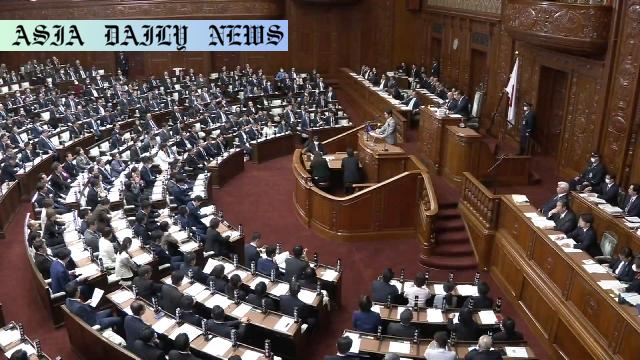Budget: Japan’s Lower House passes budget for fiscal 2025, first revision in nearly three decades, with tax measure adjustments.
Japan’s Lower House passed the 2025 fiscal budget at 115.2 trillion yen.
The budget was revised and reduced by about 2.3 billion dollars.
Historic first budget reduction in 70 years, and the first revision in 29 years.
Budget adjustments stemmed from a tax measure causing revenue reductions.
The governing coalition aims to pass it in the Upper House by fiscal year-end.

Introduction: A Historic Budget Milestone
Japan’s budget for fiscal year 2025 has become a landmark event in the nation’s economic trajectory, following its approval by the country’s Lower House. The bill, totaling 115.2 trillion yen (approximately $770 billion), represents an extraordinary achievement as it includes the first reduction in budget amounts in 70 years—a reduction driven largely by specific tax reforms. This also marks the first time in 29 years that an initial budget bill has been revised in the Diet. With a nation that has long focused on stability in fiscal planning, this decision underscores incredible shifts not only in governance but also in the approach to economic sustainability.
The Context Behind the Revision
The decision to revise Japan’s fiscal 2025 budget stems from a broad consensus involving the ruling coalition—comprising the Liberal Democratic Party and its partner Komeito—as well as the opposition Japan Innovation Party. The budget had to be trimmed by approximately $2.3 billion due to tax measures expected to adversely impact revenue. Specifically, the amendments include raising the income threshold for taxation, signaling a move towards easing the financial burden on middle and low-income citizens. Such tax reforms are refreshing, reflecting a focus on fairness while simultaneously addressing public expectations for governmental accountability.
The Legislative Journey
The amended budget bill’s approval followed rigorous discussion and deliberation at both the committee and plenary levels. While it enjoyed support from the ruling and aligned parties, key opposition factions such as the Constitutional Democratic Party of Japan, the Democratic Party for the People, and the Japanese Communist Party voted against the proposal. This divergence in opinions highlights underlying tensions regarding appropriate fiscal strategies and their long-term implications in Japan’s already fragile economic environment. Despite disagreements, the revised budget is set to be presented to the Upper House, where it is expected to pass, thanks to the ruling coalition’s majority.
Looking Ahead: Impacts and Challenges
While the reduction in Japan’s fiscal budget might appear minor in absolute terms, its symbolic significance cannot be overstated. The historic adjustment represents a move toward a responsive and flexible government that is prepared to adapt to shifting economic realities. Raising the income threshold for taxation is poised to provide relief to households and may stimulate consumer confidence. However, the reduced budget also brings challenges—particularly in critical sectors like public infrastructure and social welfare, where funding adjustments may necessitate difficult trade-offs.
Conclusion: Towards Fiscal Prudence
The decision by Japan’s Lower House to pass the revised budget marks a transformative milestone in fiscal governance. By reducing the budget for the first time in 70 years and revising an initial budget for the first time in nearly three decades, the Japanese government has highlighted its commitment to pragmatism and adaptability. Moving forward, the successful enactment of this budget could pave the way for further reforms aimed at ensuring greater fiscal discipline while addressing citizens’ needs in an equitable manner. The final negotiation in the Upper House will undoubtedly carry significant weight in defining the future trajectory of Japan’s fiscal policies.



Commentary
Groundbreaking Adjustment in Japanese Fiscal Policy
The news of Japan’s Lower House passing a revised budget bill for fiscal 2025 is undeniably historic and serves as a testament to the evolving needs of the country’s financial governance. For a country known for its conservative budgetary practices, this revision highlights Japan’s newfound awareness of economic dynamism and the necessity to respond to changing social and economic pressures. By reducing the budget after seven decades, the government not only acknowledges revenue shortfalls but also sets an example of fiscal accountability worthy of emulation globally.
Balancing Fiscal Prudence with Social Equity
The decision to raise the income taxation threshold within this budget revision is particularly noteworthy. It reflects a balanced vision of fostering fairness while attempting to maintain revenue growth amidst challenges. Governments across the world often struggle to reconcile the need for progressive taxation with their long-term economic goals, and Japan’s latest effort demonstrates strategic foresight. This move could potentially reinvigorate consumer spending while alleviating financial pressures on the working class, fostering an environment for gradual economic recovery.
The Role of Legislative Weight in Japan’s Political Sphere
One fascinating aspect of this legislative journey is that the ruling coalition—which lacks a majority in Japan’s Lower House—relied on cooperation from an opposition party to ensure the budget’s passage. Such consensus-driven decision-making is rare in global politics, underscoring the importance of inter-party collaboration in achieving meaningful reforms. However, the resistance from significant opposition groups also calls attention to concerns about the long-term applicability of the revised budget.
The Road Ahead for Japan’s Economics
While the revised budget awaits discussion in the Upper House, its implications for Japan’s governance and economy are profound. If enacted successfully, it could usher in a new era of pragmatism within Japan’s financial architecture. Nevertheless, it also poses risks, as reduced funds may strain various sectors reliant on government funding. The government must proceed cautiously, ensuring that fiscal prudence does not come at the expense of social welfare or economic growth.